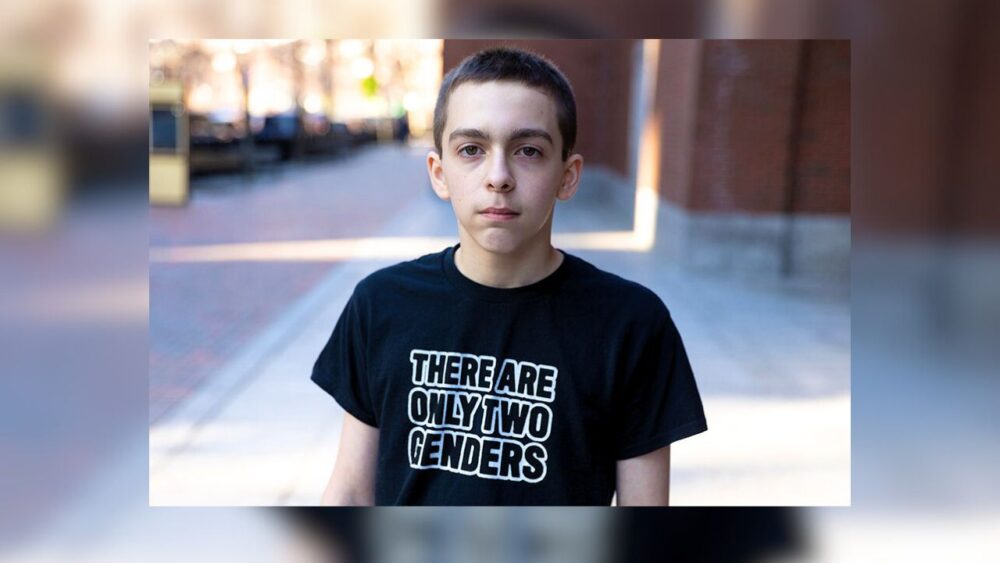The U.S. Supreme Court declined to hear a Massachusetts student’s challenge after he was barred from wearing a T-shirt that read “There are only two genders” to school on May 27.
The Court’s decision preserves a lower court ruling siding with Nichols Middle School in Middleborough, Massachusetts, which had told then-seventh grader Liam Morrison to remove the shirt or leave school. The case, L.M. v. Town of Middleborough, drew national attention and divided legal experts, parents, and civil liberties groups over how far First Amendment protections extend inside public school classrooms.
Morrison, who brought the case with the help of his father and stepmother, was represented by the Alliance Defending Freedom (ADF) and the Massachusetts Family Institute. His legal team argued that his constitutional rights were violated when he was sent home twice in 2023 for refusing to remove T-shirts bearing messages critical of gender ideology—one reading “There are only two genders,” and a second with “There are [censored] genders” written on tape covering the original wording.
School officials reportedly defended their actions with complaints from others in the school and concerns that the shirts made classmates—particularly those who identify as “transgender”—feel unsafe.
Both a federal district court judge and the Boston-based First U.S. Circuit Court affirmed the school’s decision.
The Supreme Court’s refusal to intervene was announced as part of a routine order list. While most denials are unsigned and unexplained, Justices Clarence Thomas and Samuel Alito both dissented, warning that the case raised significant questions about student expression and viewpoint discrimination.
In a detailed dissent, Alito called the situation “an issue of great importance for our Nation’s youth,” arguing that schools cannot selectively permit speech based on whether it aligns with their ideological preferences.
“Public schools may not suppress student speech either because it expresses a viewpoint that the school disfavors or because of vague concerns about the likely effect of the speech,” Alito wrote.
Thomas, who has previously argued that student speech rights may not be protected by the Constitution at all, nonetheless joined Alito in dissent. He emphasized that under Tinker v. Des Moines—a 1969 Supreme Court precedent that prohibits schools from censoring student speech unless it causes substantial disruption—Morrison’s shirt did not meet the standard for suppression. Thomas wrote, “Unless and until this Court revisits it, Tinker is binding precedent.”
ADF Senior Counsel David Cortman said in a statement that the group was “disappointed” by the Court’s decision. “Students don’t lose their free speech rights the moment they walk into a school building,” Cortman said, pointing to what he described as a double standard where schools allow pro-LGBT messages while censoring dissenting views.
The case reignited debate about how far public schools should go in managing speech. In online forums, including a Reddit thread that received over a thousand upvotes and comments, users were sharply divided.
“The fact that this case even made it to the Supreme Court in the first place is laughable,” one Reddit user wrote. “And the fact that Alito and Thomas wanted to waste time ruling on it is telling.”
Others disagreed. “It’s truly insane how the courts have bastardized the Tinker test,” another user posted. “We’re now in a place where political viewpoints that make someone feel uncomfortable are deemed dangerous.”
In Tinker v. Des Moines Independent Community School District (1969), the Supreme Court ruled in favor of a group of students who had been suspended for wearing black armbands to school to protest the Vietnam War. The Court held that students do not “hold their constitutional rights to freedom of speech or expression at the schoolhouse gate.” The decision established a key precedent: public school officials cannot censor student speech unless it would cause a substantial disruption to the school’s operation.
The ruling underscored the principle that student expression, even if politically charged or controversial, is protected under the First Amendment. In the Tinker case, the Court found that the students’ silent protest did not disrupt the educational environment and, therefore, could not be lawfully punished. The case has since become a cornerstone of student free speech rights in America, frequently cited in legal arguments and public debates involving expression in schools and online platforms.
This latest case echoes previous high-profile student speech battles, including Morse v. Frederick (2007), in which the Court sided with a school that disciplined a student for displaying a “BONG HiTS 4 JESUS” banner. In that case, both Thomas and Alito were part of the majority, though Alito issued a narrower opinion reserving room for political expression.
While the Court’s decision not to take the case leaves the appeals court ruling intact, it does not establish a national precedent.


